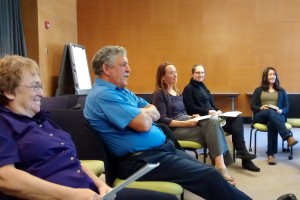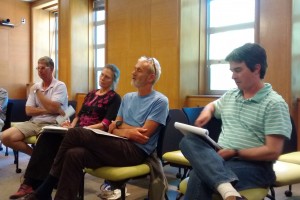

How can you adjust your teaching practices so that students remember more of what you teach? What strategies are your colleagues using that students find useful? These questions and more were discussed at the SIPS Teaching Conclave held September 28th.
Marvin Pritts, Director of Undergraduate Studies for the Plant Sciences, began the discussion with a review of Make it Stick: The Science of Successful Learning, the subject of a symposium attended by Pritts last spring. In it, the authors reference research supporting the value of both information input AND retrieval for long-term retention.
Specific findings include:
- Students retain more information if they are given more opportunities to practice recall
- Frequent, low stakes evaluations such as weekly quizzes provide more opportunities to practice recall than a course plan with only one or two major exams
- Taking written notes rather than typing verbatim enhances recall of information
- Students can rely too heavily on reading while studying, giving them an illusion of mastery that does not translate into application in the absence of practicing information retrieval
Follow-up among the 15 SIPS faculty and staff in attendance touched on the merits of different teaching tools such as frequent problem sets to promote deeper understanding of concepts and flash cards in information-intensive classes.
Leah Cook, Plant Sciences Undergraduate Program Coordinator, shared results and general impressions from the 2015-2016 Peer Review of Teaching. Comments from the peer-reviews of 30 undergraduate courses were grouped according to topics including lecture style, strategy for getting feedback, approach to testing, and the value of PowerPoint presentations, handouts, clickers, and interactive sessions.
The following discussion was largely driven by questions and useful reflections by those attending. Topics included strategies for encouraging in-class participation, how to assess when students are confused, use of laptops and recording devices in class, and the value of flipped and partially flipped classrooms.
Together with Bryan Duff, Director of the Undergraduate Education Minor, Cook emphasized the value of the peer review process. While the results are not included in promotion materials, peer review represents an important tool for improving teaching and sharing best practices, and the college expects it to be conducted on a regular basis. Previous participants have found the process extremely valuable for increasing their effectiveness as instructors.
More information:
- Make it Stick: The Science of Successful Learning (Mann Library also has two copies)
- Center for Teaching Excellence: Guidelines for Peer Review of Teaching
- Class Participation Rubric used in PLHRT 4940 (also addresses electronics use in the classroom)
To learn more about Peer Review of Teaching in SIPS, contact Marvin Pritts (mpp3_at_cornell.edu) and Leah Cook (lcc2_at_cornell.edu). The next SIPS-wide Teaching Conclave will be held on November 30.
